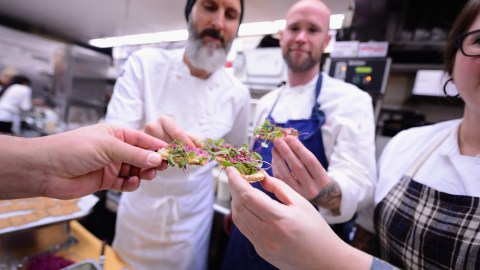The High Price of Spiritual Nutrition

Cult leaders come in many shapes and sizes. The traditional figurehead makes metaphysical promises that appeal to an in-group mentality: I’m the only one that has the special sauce, so if you want to drink from my vat, follow me.
There are cults of personalities in every industry, though perhaps nowhere more pronounced than in really making the sauce. Food appeals to our most basic animal urges—nutrition is emotional, nurturing, and necessary. If you can market a profoundly elevated sense of yourself with gastronomy, you’ve struck alchemical gold.
Egotism embedded in the culinary industry is profound. As Michael Pollan notes, we went from a cooking species to a species that likes to watch others cook. Too many shows to list, too many unchecked egos, too many, as the saying goes, chefs in the kitchen have created celebrities of deserving and not-so-deserving figures.
There’s a world of difference between being prideful in your cuisine and believing your culinary mission is part of a spiritual crusade, which is where chefs and celebrities and celebrity chefs become cultish. Nowhere is this more noticeable than in veganism.
Before we journey down that rabbit hole, let’s pause to remind ourselves that veganism is predominantly a response to an environmentally toxic and morally bankrupt food production system. I ate vegan for two years. While it didn’t offer what my body needed, I commend people that stick by their ethics and digestive systems.
Yet moral superiority combined with a bloated industry of food personalities has resulted in noxious charlatans exhibiting virulent behavior. False promises of superfoods with no nutritional science research, overpriced specimens of precious seeds and herbs, and pretentious marketing campaigns form the foundation of an infeasible fundamentalism.
Our species evolved by eating whatever the ground, water, and sky provided. In the span of a generation crafty salesmen make millions on the idea that this grain or that mineral is the key to everlasting health.
Enter Sarma Melngailis. Shortly after her restaurant, Pure Food and Wine, opened near New York’s Union Square I recall having to find another meal after spending fifty dollars for a plate of leaves, a vegan pizza on some form of cracker, and a smoothie. The food was fine but overrated; you were paying for status, something the property’s marketing team constantly reminded you of with celebrity-strewn photos.
Mental illness is no joke, and from following the Melngailis story over the last year it makes no sense to speculate on the neurochemical deviations that might have aided in her demise. That said, embezzling nearly a million dollars from investors, not paying your employees, and believing your dog is immortal does fit into longstanding cult narratives of being above or separate from the rest of the population. This mindset was very much part of the restaurant’s ethos from day one: veganism was going to save the world, and by planting our flag as the fine dining vegan experience, we’re going to lead the way.
Fortunately, as the Vanity Fair article reveals, Melngailis has made amends with her past and is in the process of figuring out how to pay former employees even as she faces up to fifteen years in jail. Her disconnect from reality has apparently ended, which is a positive result. Not everyone is so lucky.
Such is the case with Amanda Chantal Bacon, owner of the chic Los Angeles chain, Moon Juice. In May 2015 Bacon kept a food journal for Elle and listed her daily diet. It includes foodstuffs such as silver needle and calendula tea, ho shou wu, bee pollen, and activated cashews. The absurdly pretentious diary went viral for statements like this:
At 11pm, I had a nightcap of heart tonic and raw chocolate made from one of my big batches—this one was made with our Moon Pantry heirloom raw cacao, reishi and Chaga mushroom, sprouted brown rice protein, and coconut oil. I love chocolate—and on some evenings, I don’t want to deny the indulgence—so I’ve devised a million low glycemic recipes.
Chefs have long known the way to the stomach is through adjectives. Bacon’s vocabulary is filled with obscure and seemingly important ones. (‘Activating’ simply means sprouting, but oh how nineteen-seventies.) One would think the backlash to the journal would create an opportunity for humility, but a follow-up has only strengthened her resolve:
The greatest thing to ever happen was the health-shaming that went down—you wouldn’t believe all the hits we got on our website. If even 2 percent of that traffic made a difference in someone’s life, if they learned just one thing, I’ll take it. Health shame me all day long!
Bacon fails to realize that the shaming has nothing to do with health, which isn’t surprising from someone selling twenty dollar packets of stevia-laced sex dust that has nothing to do with sex. I personally wouldn’t trust sex advice from a person whose screening process involves her assistant checking newspaper ad respondents, though the mindset does oddly line up with another cultish figure, Bikram Choudhury. After paying $6.4 million for allegations of rape and losing a sizable part of his American empire to his wife of thirty-one years, he recently claimed women line up for his million-dollar sperm.
Humility be damned in modern spirituality. If you have a ware to sell anything goes. The miraculously transformative soul-shattering reverberations of rare mushrooms and goji berries not only regenerate a new liver, they give you a profound sense of righteousness once reserved for prophets and sages.
Speaking of sage, my new line of scarce sage blossoms magically cures edema and nationalism, and is yours for the high price of…
—
Derek Beres is working on his new book, Whole Motion: Training Your Brain and Body For Optimal Health (Carrel/Skyhorse, Spring 2017). He is based in Los Angeles. Stay in touch on Facebook and Twitter.





